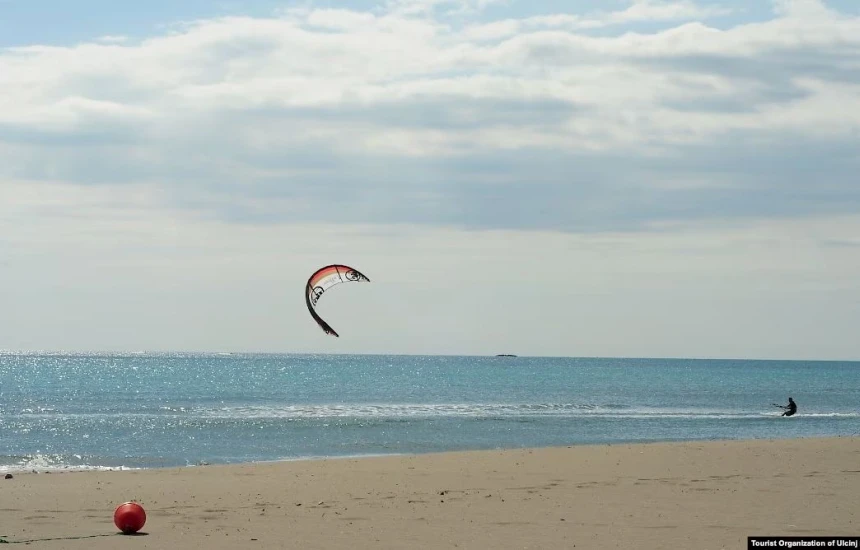This year’s tender for leasing beaches in Montenegro was marked by the involvement of Arab billionaire Mohamed Alabbar, whose newly established company, “Eagle Hills,” was ranked first for managing nine beaches in Ulcinj, reports RFE.
Although Alabbar has publicly stated multiple times that he intends to withdraw from the project and called his participation a “mistake,” his withdrawal has not yet been made official, said Petar Delić, Deputy Mayor of Ulcinj, in a statement to Radio Free Europe.
“If Alabbar officially withdraws, as he signaled again in mid-May, we expect that the second-ranked bidders will be invited to sign the contracts,” Delić stated.
The tender involved around 60 beaches along the Ulcinj Riviera. Alabbar’s company submitted offers for 19 beaches and won nine as the top bidder.
“In most cases, his offer was about €5,000 higher than the second-ranked bidders,” added Delić.
Negotiations with Alabbar’s Company
A former leaseholder, whose identity is known to the newsroom, revealed that some participants in the tender are negotiating with Alabbar’s representatives regarding bank guarantees.
Each tender participant must provide a bank guarantee equal to the starting price of each individual location. If the top bidder withdraws, the public company Morsko Dobro activates the guarantees.
According to Morsko Dobro, Eagle Hills’ guarantee for the nine beaches is around €600,000.
One withdrawal option under discussion is cost-sharing between Alabbar and the second-ranked bidders, said the same anonymous source.
Due to ongoing negotiations, no further details were provided, but the source noted that “everything should be clarified” by May 31—the deadline for signing contracts.
Eagle Hills has not responded to RFE’s inquiries about what exactly is being negotiated and under what conditions.
Tender Rules
If Alabbar officially withdraws from the four-year lease contract, Morsko Dobro will activate the bank guarantees and offer contracts to the second-ranked bidders.
Transferring the contract to a third party is only possible with prior approval from Morsko Dobro.
Subleasing—operating through another party—is allowed only after the contract is signed, and the original leaseholder remains fully responsible for all contractual obligations.
In such cases, the tender guarantee is not activated, but the contractual guarantee (čindibena garancija) can be triggered if the leaseholder fails to meet obligations.
Alabbar has not explained why he entered the tender if he intended to withdraw, nor did he respond to RFE’s questions regarding his motives.
From Beach Leases to a Mega Construction Project
Economist Mirza Krnić from the movement “Preokret” said that Alabbar’s motives are unclear and that many contradictory speculations are circulating.
He linked the tender participation to plans for large-scale construction near the Long Beach (Velika Plaža).
“It seems like the tender was a setup for something bigger—land allocation, infrastructure preparation, and legal adjustments for the investor’s interests,” Krnić explained.
“What’s positive is that public pressure on the Prime Minister has worked,” he added.
Eagle Hills Montenegro was registered just two days after the deadline for the tender was extended by a week beyond the original February 4 date. The company was founded with only €1 in capital.
According to Fidelity Consulting, the company obtained documents and 19 bank guarantees worth €1.85 million within days.
After Eagle Hills was declared the top bidder for nine beaches, locals and Ulcinj officials protested, citing tripled lease prices and rules that favored large corporations over local operators.
By late March, the government announced that, on Prime Minister Milojko Spajić’s initiative, Alabbar would hand over the beaches to local entrepreneurs.
During a visit to Ulcinj, Spajić said that Alabbar envisions developing the 13-kilometer Long Beach, where €30 billion in investment is planned.
This mega-project is part of a cooperation agreement between Montenegro and the United Arab Emirates, approved in Parliament on April 23.
However, the agreement has faced criticism from civil society, activists, and Ulcinj officials, who argue it violates the Constitution, laws, and public procurement procedures.
Montenegrin President Jakov Milatović returned the agreement for parliamentary reconsideration, citing concerns about legal suspensions and lack of risk-benefit analysis.
A revote in Parliament is scheduled for May 29.
Suspicion of Bid Manipulation
This year’s tender also drew attention due to astronomically high offers for some small beaches in Budva.
For 15 locations, unrealistic bids up to €6 million were submitted. No contracts were signed for these locations.
Morsko Dobro claims that some bidders didn’t intend to follow through but wanted to manipulate the rankings.
A very high bid guarantees top score, while the former leaseholder, due to experience, ranks second. If the top bidder withdraws, the second can win the lease at the minimum price.
In such cases, bank guarantees have been activated, and Morsko Dobro reserves the right to relaunch the tender with additional protective rules.
Morsko Dobro’s director, Mladen Mikijelj, has requested the Special Prosecutor to investigate the suspicious bids, but so far, there has been no official response.
Montenegro’s coastline includes 563 public beaches, 70 hotel beaches, and around 1,500 temporary structures. This year, lease income is projected at around €35 million.







